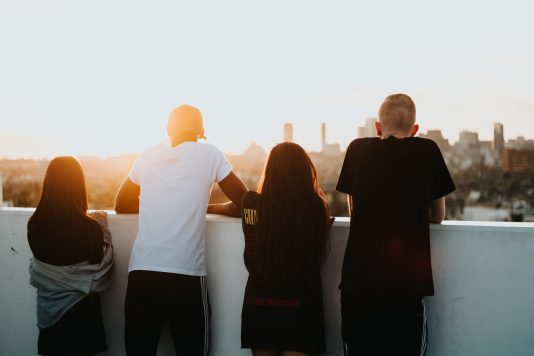


“The need for friendship is of the utmost importance for teens, so much so that we can even say it’s friendship that enables them to hold up in a world they often perceive as closed and hostile. […]
When their emotional needs are not met, teens feel a sense of abandonment and rejection. To understand is already to love, says Bernanos. But to love is also to understand.”
–Michel Fize, Antimanuel de l’adolescence
The need for love and affection is an essential component of the human experience, and is all the more vital for teens from disadvantaged backgrounds who sometimes face discrimination and rejection from their peers. According to psychoeducator Vickie Bois, the fact that they are not able to conform to societal standards, such as wearing designer clothing, can lead to bullying or exclusion. Yet the need to belong is crucial in adolescence.
Be it in the form of familial love, friendship or romantic relationships, affection is the foundation of solid connections and feeds into teens’ social and emotional development. However, for young people from precarious backgrounds, these connections can sometimes be hindered by economic, social and psychological constraints.
In a world that is hyperconnected, yet one where social gaps are growing ever wider, travel becomes a way of forming authentic human connections, free from discrimination.
Why do young people from precarious backgrounds have more difficulty developing meaningful emotional connections?
Because they are more likely to grow up in single-parent families suffering from financial, family, psychological and social difficulties, young people from disadvantaged backgrounds have more problems with self-esteem, which negatively impacts their social relationships.
Sometimes neglected by parents dealing with addiction and psychological difficulties, teens from disadvantaged backgrounds are, as a result, more likely (one in three children) to be at risk in at least one sphere of development (social skills, emotional intelligence, communication skills, etc.) when they start school. In fact, research shows that the majority of young people with emotional problems also display behavioural issues or oppositional disorders.

Vickie Bois suggests that, when attachment figures are less available on an emotional level, young people feel they’re not worthy of being loved or invested in. In the absence of healthy role models, teens sometimes have trouble picturing themselves having a promising future and can lose hope and disengage from school due to a lack of a life plan.
Unfortunately, adds Vickie Bois, this premature distancing from school further isolates young people from disadvantaged backgrounds, leading them into unstable and poorly paid jobs. This situation plunges them into mediocre living conditions, which are especially exacerbated by the pandemic and the rising cost of living.
Furthermore, teens from precarious backgrounds can suffer from solitude within their families. Sometimes driven to prematurely leave the family home to escape conflicts with their parents, teens find themselves cut off from an important source of affection and can fall into addiction, which further aggravates their emotional and relational difficulties.
Studies show that half of the young people who report psychotropic drug abuse also display anti-social or emotional problems.
«Research shows that the majority of young people with emotional problems also display conduct disorder or oppositional disorder. »
For other teens, their family’s low income can complicate their social relationships by limiting their cultural outings, hobbies and social engagements due to the associated expenses (transport, buying equipment, etc.). Vickie Bois adds that, since these young people are less involved in extracurriculars or sports, they experience less success compared to their more affluent peers and have a weaker sense of belonging to a group.
In terms of romantic relationships, teens in precarious situations often have more trouble than their peers who are better-off since they may suffer from insecurity linked to relationship difficulties with their parents. In fact, young people from disadvantaged backgrounds often experience family conflicts with separated parents and single mothers. These women, sometimes suffering from anxiety due to a lack of support, are not always able to deal with their children’s emotions and give them the sense of security they need to emotionally grow.
Teens can therefore be driven to become sexually active prematurely or start a family very young to try and “solve” their familial difficulties. According to Vickie Bois, the lack of awareness on available contraception can also increase the number of unplanned teen pregnancies, raising their stress levels and psychological difficulties.

How can travel help teens from disadvantaged backgrounds form authentic emotional connections with others?
By offering an environment far from their normal surroundings, travel offers teens the possibility of getting to know themselves on a deeper level by guiding them to reflect on their identity, aspirations and values. This journey of discovery is paramount for their emotional development.
According to Vickie Bois, the intense experience that travel offers is also an opportunity for teens to share experiences with their peers and develop meaningful connections. In this way, young people are able to share their experiences and learn that, not only are they not the only ones going through these difficulties, but also that it’s possible for them to help each other face up to their challenges.
All this learning helps young people shape their identities and improve their self-esteem, as well as deepening their understanding of their emotional needs.
According to the “Hors les murs” initiative, led by a team of psychoeducators (including Vickie Bois) and the CISSS de la Montérégie-Ouest, which follows young people between the ages of 14 and 17 experiencing psychological difficulties, 71% of teens saw an increase in their self-esteem and 57% saw a greater frustration tolerance after their humanitarian trip.
What’s more, working on a travel project in class allows teens from precarious backgrounds to develop their social skills and a feeling of belonging in school. Dropped into an unfamiliar environment outside of their comfort zone, young people must communicate, solve problems and collaborate with others, which enables them to gain new interpersonal skills and create stable and long-lasting relationships with their peers in a school setting.
Through the “Hors les murs” initiative, more than half of parents (57%) suggested that, on an academic level, young people were more motivated in school (50%) and had raised their engagement and attendance after their trip.
Moreover, belonging to a group of peers during adolescence encourages a natural and long-lasting decrease in socially inappropriate behaviour, as the influence of other young people is pivotal at this age. For example, when a member has a counterproductive attitude, the entire group reflects on their behaviour and encourages them to adopt more constructive actions, leading the teen in question to adapt.

Fundamentally, travel opens up new horizons for teens to expand their social circle. Teens from precarious backgrounds often have limited interactions with people from different upbringings due to financial or geographical constraints. However, travel enables these young people to break through the barriers of their everyday lives and redefine their social identity. Teens are also guided toward becoming more tolerant and open to differences, which strengthens their ability to peacefully integrate with others.

According to Vickie Bois: “Such a transformative experience offers unparalleled opportunities to develop healthy and meaningful friendships within a safe environment.
Teachers’ support helps young people to improve their ability to express their emotions and validate those of others, which are crucial skills for adult life. The lived experience during the trip also allows them to reestablish their self-esteem, often weakened through hardships, and to rediscover hope regarding the future.”
